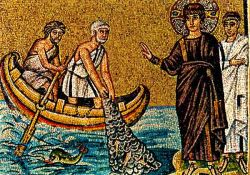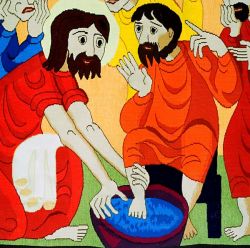Prayer for Christian unity
Week of prayer for Christian unity
Permit it not, o Lord, that Thy people should cease from being, and try to remove sin by means that are themselves sinful, or to cure evil by another evil
18 - 25 January 2010
Week of prayer for Christian unity
Holy Father,
who hast glorified Thy Son Jesus
and hast conferred upon Him power over all flesh,
so that he may grant eternal life
to all those who have believed in Him, God and Saviour;
we give Thee thanks that Thou hast vouchsafed unto us men
to know the consubstantial unity
beteen Thee, Thy Son, and Thy Holy Spirit
to which Thou hast called us
by the prayer that Thy Son made onto Thee:
«That they may all be one;
even as Thou, Father, art in Me, and I in Thee,
that they also may be one in us,
so that the world may believe that Thou hast sent Me» (Jn 17:21).
Indeed we believe
that the unity to which Thou hast called us
is necessary for the witness
of the mystery of Thy work in human nature,
a nature prone to corruption and disintegration
because of sin and selfishness.
Likewise, this unity is necessary that the world may believe
that it has no other hope
but in the person of Jesus, Thy dearly beloved Son,
whom Thou hast sent to join the things of heaven with the body.
We acknowledge and confess that the advent of Thy Son in our hearts
must create in us an immediate drawing towards unity:
«I in them, and Thou in me,
so that they may become perfectly one,
so that the world may know that that Thou hast sent me
and hast loved them ever as Thou hast loved Me» (Jn 17:23).
It follows, therefore, that any opposition on our part
to the perfection of unity in Thee,
a unity which Thou hast sought for us,
is in us weakness of faith
and lack of charity.
These shortcomings cause us to place
ideological, political, and racial controversies
above the demands of conscience, faith, and love
and cause us to stifle the voice of Christ in our hearts
in order to satisfy the world and man.
Holy Father,
glorify Thy Son in the life of Thy Church,
so that the Church may glorify Thee and glorify Thy Son
when all have rid themselves
of everything that hinders unity and hampers charity.
Permit it not, o Lord, that Thy people should cease from being,
and try to remove sin by means that are themselves sinful,
or to cure evil by another evil;
permit it not that unity should be sought
through differencies of opinion,
charity confounded with politics, and racial alignments
considered as a spiritual force.
Matta el Meskin
CATECHESIS ON CHRISTIAN UNITY
It is because the Christian seeks God that he seeks unity; he feels it present in his soul, according to the measure in which he feels the presence of God.
Christian unity is, therefore, a supreme demand of faith; we seek it because it is entreating us from the bottom of our hearts. Yet, since all do not have the same awareness of God, unity is not approached from the same angle; it expands or contracts within men in proportion to their hearts' relationship with God. Some do not feel it at all; others even deny it. It is a test of faith.
The principle of unity springs initially from a maturity of faith and from an overflowing spirituality which bursts through the barriers of hate, the variance of thought, the discords of the soul, the inventions of the intellect, and the cares of the flesh. The unity of men is an ideal that surpasses human strenght if it is sought at a divine level. It flows, as a necessity, as an inevitable, and direct consequence, from the union of man with God.
This is a well-known law of spirituality, based as much on practical experience as on the repeated witness of the Scripture. The first commandment says, "You shall love the ord your God with all your heart, and with all your soul, and with all your mind", and the second: "You shall love your neighbor as yourself (Mt 22:37-39). Scripture affirms here that the second commandment springs from the first. It is from the first that it proceeds. The second without the first would have no value; it will indeed be near to sin.
MATTA EL MESKIN
{link_prodotto:id=462}

